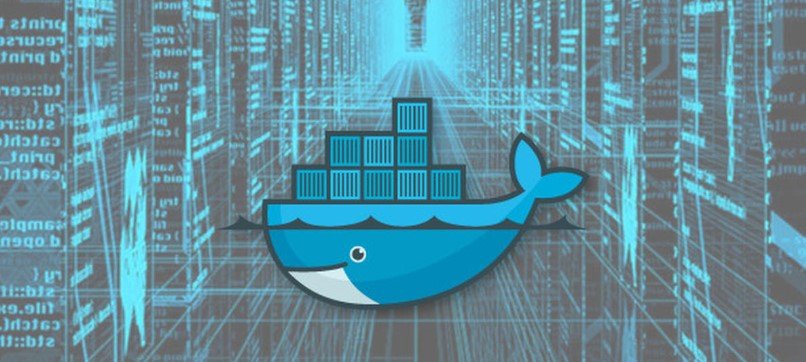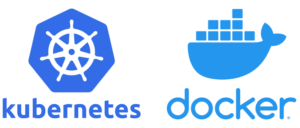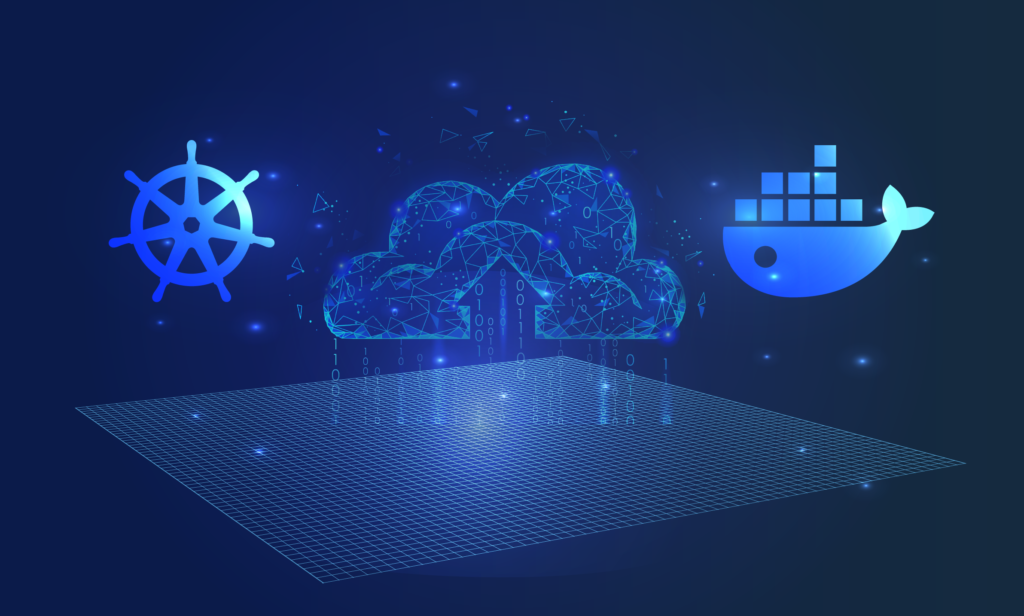Docker is a famous and reliable solution. Kubernetes is becoming even more popular nowadays. The battle “Kubernetes vs Docker” may easily mislead because they aren’t direct competitors. Docker is a containerization platform, while Kubernetes is a container orchestrator for such platforms as Docker.
We could end this article on this fact, however, it is not so simple. This battle leaves many questions, ![]() so if you are here, then let’s figure it out together.
so if you are here, then let’s figure it out together.
Which is best – Docker or Kubernetes? Does Kubernetes use Docker? These are just a few of the issues that concern many of you. However, we often deal with many more questions. In this post, we’d like to clarify some common confusion surrounding Docker and Kubernetes and explain the main differences between them.

The Power of Containers and Containerization
It would be strange to talk about Docker without exploring containers first. In the application development environment, containers play an important role in solving some critical issues.
All developers work on their local development environment while writing code. When the code is ready for production, they can face challenges. The perfectly worked code may not work in production. Why does it happen? The reason may relate to operating systems, various dependencies, or libraries. Containers are aimed to solve this critical issue of portability. They allow separating code from the underlying infrastructure it is working on. Containers can be run on any computer that has a containerization platform.
What are the additional benefits containers provide?
The main problem that containers solve is portability. Additionally, container platforms and containers provide some vivid benefits over traditional virtualization.
- An extremely small footprint is one of these benefits containers present.
- Container isolation is done on the kernel level and there is no need for a guest operating system.
- Saving space is also a matter. Libraries can be across containers. It eliminates the need to have copies of the same library on a server.
What is Docker?
Docker is a popular lightweight open-source containerization technology. It was open source from the very beginning (that probably led to its current market success).
With its help, you can automate the application deployment in lightweight and portable containers. Docker also allows running multiple OS on the same host. Virtualization in Docker is performed on the Docker containers.

Many people mean Docker Engine when talking about Docker – the runtime that allows creating and running containers. However, before running a Docker container, you should start with a Docker File. It defines everything needed to run the image.
The Role of Orchestration Systems
As Docker represented an open standard for packaging containerized apps, a new problem arose. This problem was related to the way how these containers would be scheduled and coordinated. It was also important to understand how to upgrade an app without the interruptions of service as well as how to track its health.
Thus, the solution for orchestrating containers emerged. Kubernetes (along with Docker Swarm and Mesos) is one of the most reliable options for providing an abstraction to make a cluster of machines behave like one big machine.
Nowadays, it is the leader on the market that can be run on a public cloud service or on-premises. So, what is Kubernetes exactly?

What is Kubernetes about?
Kubernetes is an open-source container software developed on the base of the Google platform. It provides a way to automate the deployment and management of multi-container applications across various hosts, without the need to manage each container directly.
Kubernetes is a rather flexible tool for delivering even the most complex applications. The app runs on clusters of hundreds to thousands of servers that also allows managing it more effectively. Kubernetes requires enough expertise to use it well.
Kubernetes vs Docker: Comparing Two Powerful Systems

Although there is no real rivalry between Docker and Kubernetes concepts, as we mentioned above, the real contest may exist in Docker Swarm vs Kubernetes. They are both container management and orchestration engines. they help to deploy containers, track performance, automate updates, and realize failover procedures.
Comparing Kubernetes and Docker Swarm, the first one is a more comprehensive tool than Swarm, giving users the ability to build on top of Kubernetes clusters. Kubernetes works perfectly well with Docker to facilitate the management and deployment of containers in distributed architectures.
In order to understand better their specialties and evident difference, let’s explore the pros and cons of Docker and Kubernetes.
 The pros of Kubernetes
The pros of Kubernetes
- Advanced speed. This is the best choice to continuously deploy features without downtime. Kubernetes can update applications with constant uptime.
- Logging. You get support for multiple versions of logging and monitoring when services are deployed within the cluster.
- Scale. Thanks to the declarative Kubernetes’ nature, the system scales better through such methods as horizontal infrastructure scaling, auto-scaling, and manual scaling.
- Declarative configuration. To avoid errors, the system showcases the state it is in to inform users where it should be.
- Replication controller. Kubernetes guarantees the cluster has equivalent pods in a running condition. It also removes extra pods or adds them as necessary.
- Storage. It shares data across containers and stores data remotely. It keeps it intact until users decide to delete it.
 The pros of Docker Swarm
The pros of Docker Swarm
- No less high speed: Docker Swarm is known for its quick-paced environment that accelerates a virtual machine and allows apps run in a virtual environment quickly.
- Handy installation. To run all aspects of programs, Docker Swarm uses the CLI. It makes it easy to learn one set of tools to build configurations and environments.
- Familiarity. Docker Swarm runs on top of Docker, so users can feel like at home while using it to work with other Docker tools.
- Version control. Docker users are able to track container versions with ease to examine discrepancies between prior versions.
- Good documentation. Docker has comprehensive documentation efforts and continuously updates it to be relevant and accurate.
 What are the weak points of Kubernetes?
What are the weak points of Kubernetes?
- Setup challenges. There are various setup processes for each operating system in Kubernetes. It provides some complexity to the process.
- Migration. In case your app is clustered or stateless, it will lead to the extra pods not be properly configured.
- Compatibility. It is not compatible with the Docker CLI and Composes tools.
 What are the cons of Docker?
What are the cons of Docker?
- Dependency on the platform. Docker Swarm supports the Linux platform OS. And Linux requires using virtual machines to run in non-Linux platforms.
- Storage. If you aim to connect containers to the storage, then Docker Swarm is not the easiest option.
- Monitoring. There is no option for advanced monitoring in Docker, however, there are external tools available for this aim.

Docker without Kubernetes?
You can use Docker without applying Kubernetes. Kubernetes has evident advantages, but it is notoriously complex. Moreover, there are many scenarios where the overhead of spinning up Kubernetes is unwanted or looks unnecessary.
It is rather common in the development environment to use Docker without a container orchestrator. In production, the advantages of using a container orchestrator often don’t outweigh the cost of added complexity.
Kubernetes without Docker?
A container orchestrator will surely need a container runtime in order to orchestrate. Kubernetes is typically used with Docker, but it can also be used with any container runtime.
Conclusion
The world of containers is an amazing environment. In their niches, both Docker and Kubernetes are considered top-class solutions. They are continuously changing and transforming into something better. They rely on their strengths to evolve with the industry. While they are not exactly rivals, these solutions propose their comprehensive benefits that signify their essence and relevance.
Hopefully, now you will have something to say when you hear the dispute “Kubernetes vs Docker”. Choose the containers that your infrastructure needs the most and get brilliant outcomes!





